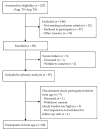The Course Of IGF-1 Levels and Nutrient Intake in Extremely and Very Preterm Infants During Hospitalisation
- PMID: 32131447
- PMCID: PMC7146384
- DOI: 10.3390/nu12030675
The Course Of IGF-1 Levels and Nutrient Intake in Extremely and Very Preterm Infants During Hospitalisation
Abstract
Background: Insulin-like growth factor 1 (IGF-1) plays an important role in the complex association between nutrition, growth, and maturation in extremely and very preterm infants. Nevertheless, in this population, research on associations between IGF-1 and nutrition is limited. Therefore this study aimed to evaluate the possible associations between the course of IGF-1 levels and nutrient intake between preterm birth and 36 weeks postmenstrual age (PMA).
Methods: 87 infants born between 24 and 32 weeks gestational age were followed up to 36 weeks PMA. Actual daily macronutrient intake was calculated, and growth was assessed weekly. IGF-1 was sampled from umbilical cord blood at birth and every other week thereafter.
Results: There was an inverse relationship between the amount of parenteral nutrition in the second week of life and IGF-1. Total protein, fat, and carbohydrate intake, as well as total energy intake, primarily showed a positive association with IGF-1 levels, particularly between 30 and 33 weeks PMA. Gestational age, bronchopulmonary dysplasia (BPD), and weight were significant confounders in the association between nutrient intake and IGF-1 levels.
Conclusion: Parenteral nutrition was found to be a negative predictor of IGF-1 levels, and there could potentially be a time frame in which macronutrient intake is unable to impact IGF-1 levels. Future research should aim to narrow down this time frame and to gain more insight into factors enhancing or decreasing the response of IGF-1 to nutrition, e.g., age and inflammatory state, to align nutritional interventions accordingly.
Keywords: insulin-like growth factor; nutrient intake; postnatal growth; preterm infants.
Conflict of interest statement
The authors declare no conflict of interest.
Figures





Similar articles
-
Relation between serum insulinlike growth factor-1, insulinlike growth factor binding protein-2, and insulinlike growth factor binding protein-3 and nutritional intake in premature infants with bronchopulmonary dysplasia.J Pediatr Gastroenterol Nutr. 2001 May;32(5):542-9. doi: 10.1097/00005176-200105000-00010. J Pediatr Gastroenterol Nutr. 2001. PMID: 11429514
-
An exploratory study of clinical factors associated with IGF-1 and IGFBP-3 in preterm infants.Pediatr Res. 2024 Jul;96(2):402-408. doi: 10.1038/s41390-023-02970-y. Epub 2024 Jan 8. Pediatr Res. 2024. PMID: 38191823 Free PMC article. Clinical Trial.
-
The role of maternal factors, postnatal nutrition, weight gain, and gender in regulation of serum IGF-I among preterm infants.Pediatr Res. 2005 Apr;57(4):605-10. doi: 10.1203/01.PDR.0000155950.67503.BC. Epub 2005 Feb 4. Pediatr Res. 2005. PMID: 15695599
-
IGF-1 as a Drug for Preterm Infants: A Step-Wise Clinical Development.Curr Pharm Des. 2017;23(38):5964-5970. doi: 10.2174/1381612823666171002114545. Curr Pharm Des. 2017. PMID: 28969546 Free PMC article. Review.
-
Total parenteral nutrition for the very low birth weight infant.Semin Fetal Neonatal Med. 2017 Feb;22(1):2-7. doi: 10.1016/j.siny.2016.08.002. Epub 2016 Aug 27. Semin Fetal Neonatal Med. 2017. PMID: 27576106 Review.
Cited by
-
Inflammation induces stunting by lowering bone mass via GH/IGF-1 inhibition in very preterm infants.Pediatr Res. 2023 Sep;94(3):1136-1144. doi: 10.1038/s41390-023-02559-5. Epub 2023 Mar 20. Pediatr Res. 2023. PMID: 36941338
-
Analysis of variable metabolites in preterm infants with bronchopulmonary dysplasia: a systematic review and meta-analysis.Ital J Pediatr. 2024 Nov 14;50(1):246. doi: 10.1186/s13052-024-01812-9. Ital J Pediatr. 2024. PMID: 39543750 Free PMC article.
-
Metabolic Hormone Profiles in Breast Milk From Mothers of Moderate-Late Preterm Infants Are Associated With Growth From Birth to 4 Months in a Sex-Specific Manner.Front Nutr. 2021 May 28;8:641227. doi: 10.3389/fnut.2021.641227. eCollection 2021. Front Nutr. 2021. PMID: 34124118 Free PMC article.
-
Hormonal Determinants of Growth and Weight Gain in the Human Fetus and Preterm Infant.Nutrients. 2023 Sep 18;15(18):4041. doi: 10.3390/nu15184041. Nutrients. 2023. PMID: 37764824 Free PMC article. Review.
-
Associations between Bronchopulmonary Dysplasia, Insulin-like Growth Factor I and Nutrition.Nutrients. 2024 Mar 27;16(7):957. doi: 10.3390/nu16070957. Nutrients. 2024. PMID: 38612991 Free PMC article.
References
Publication types
MeSH terms
Substances
LinkOut - more resources
Full Text Sources
Medical
Miscellaneous

